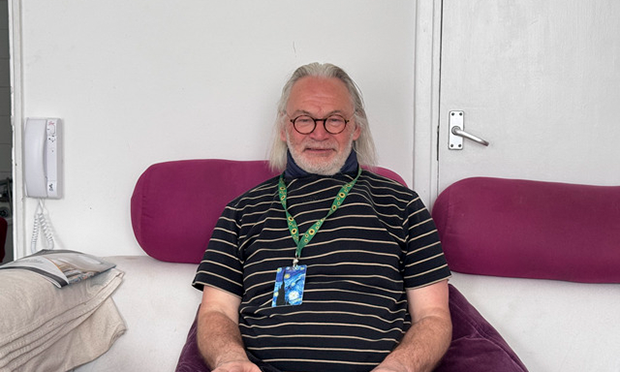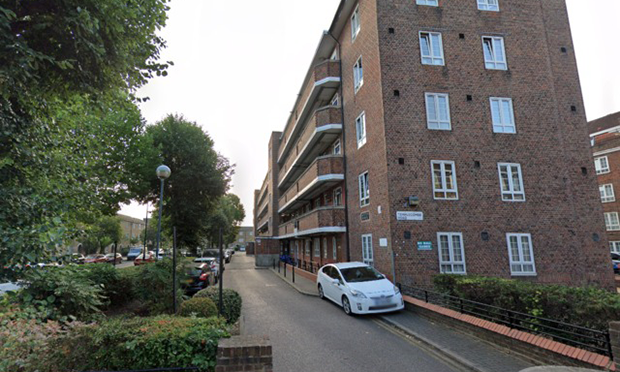‘Gaslighting’: Disabled man trapped in flat for months slams landlord over rehousing delays

Malcolm Cripps says Sanctuary Housing Association have treated him ‘not like a person but a problem’. Photograph: Josef Steen / free for use by LDRS partners
A disabled Hackney resident unable to leave his flat for months has condemned his landlord over the “nightmare” treatment he has experienced during the hunt for a new home.
Wheelchair user Malcolm Cripps asked for a transfer from his third-floor housing association flat, after being repeatedly trapped inside due to a faulty communal lift he relied on to enter and exit the building.
Cripps, who has severely restricted mobility, has found himself stuck both inside and outside his estate block on several occasions, including one “traumatising” three-to-four-month period last year when he could not leave the building at all.
His landlord, Sanctuary Housing Association, apologised for the “intermittent lift issues” and offered him alternative flats, but “none have been suitable”, he told the Citizen.
Sanctuary asked if Cripps, who is 64, would move to an older people’s residence.
According to his NHS wellbeing practitioner, this was “more like a care home”.
Cripps said he would consider this, but not before visiting. After viewing, he declined due to concerns over the impact it would have on his sensory issues and the loss of his independence.
“I couldn’t handle being in there. It felt like a psych ward,” he said.
After this, several months passed where “nothing happened”, Cripps added.
Sanctuary then offered him two other places to live, including at Kingsmead estate in Homerton, but neither of these had wheelchair access, and both had steps.
“Ironically, the person leaving one of these properties also needed a wheelchair,” Cripps said.
But his “nightmare” has gone beyond finding the right flat.
“I’ve had to fight for years just to be heard,” he told the Citizen.
“They gaslight me, they lie to me, and they ghost me when I ask questions. They don’t treat me as a person – just a problem.”
Cripps later lobbied to be transferred to one of Sanctuary’s properties at Gascoyne House because it had two lifts as opposed to one, which made him feel safer.
“At first they said it was unsuitable because it was still in void, and then it was due to works needed. Then it was because the layout was the same as the Kingsmead ground-floor property,” he said.
“But the layout was ideal. I know, because I’d seen it. It’s been smoke and mirrors.”
He said he would accept this transfer, and asked for an occupational therapist (OT) to assess what adaptations the property would need.
Sanctuary said they did not provide these, “even though I had previously viewed one of their properties with an OT present”, he said.

Weston House in south Hackney’s Old Kingshold Estate, where Malcolm was trapped for months on end. Image: Google
After this, local MP Meg Hillier and a journalist from Inside Housing contacted Sanctuary.
The housing association subsequently agreed to pay for a private OT to inspect the flat and identify any adaptations it may require.
The OT submitted a report to the landlord in December last year, but Cripps was chasing for a reply for weeks, he said.
His wellbeing practitioner said: “I’ve been working with Malcolm for two years, I don’t know how many emails I’ve written or phone calls placed to Sanctuary.”
“He has also been doing a hell of a lot of them himself,” he added.
Local councillors Clare Joseph (Labour), Penny Wrout (Independent) and Claudia Turbet-Delof (Independent) have also intervened throughout the process.
In March, Sanctuary reversed its offer for the Gascoyne House flat, which had been earmarked for a year, because the OT report said it would not meet Cripps’ long-term needs if his condition worsened.
However, Cripps was certain he could live there independently now, and disputed some of these “ideal” recommendations which he was “not consulted about”.
His wellbeing practitioner added: “The landlord is making out that the property is just too difficult to adapt, but they haven’t really explained why.
“This has happened before with Sanctuary, to other people I work with. They offer someone a flat, pay for an OT assessment and then decide they can’t make the adjustments.”
Cripps added that he and his practitioner had been asking for a meeting with Sanctuary to discuss the matter ever since they withdrew the offer, but they had not responded.
In May, the landlord told him they were unable to override an OT report, and the flat had been returned to its allocations list.
He was still worried about entering the lift where he currently lives, and had to “ram his legs into the wheelchair” to use it.
The Equality Act 2010 states that housing providers must not discriminate against disabled people, and are legally required to make reasonable adjustments.
Cllr Turbet-Delof told the Citizen she was “shocked and appalled by Mr Cripps’ disgraceful treatment, by a housing assocation that has both the means and the responsibility to do better”.
“The distress, delays and systemic failures he has experienced is simply unacceptable. No one should have to endure prolonged isolation,” she said.
“Sanctuary Housing—and all housing associations—must be held to account. They can afford to spare residents from this level of distress, and they must never forget that their duty is to support and uphold the dignity of every individual they house.”
Cllr Turbet-Delof also raised the work done by her “dedicated” colleague Cllr Joseph before she went on maternity leave, and added: “I am dismayed the efforts to support him appear to have been disregarded entirely.”
A spokesperson for Sanctuary said Hackney was “heavily oversubscribed” with residents seeking transfers, which meant all housing bands had long waitlists.
They told the Citizen: “Mr Cripps’ specific needs mean the search for a new home is not straightforward, and unfortunately a recent property was deemed unsuitable following a review of the occupational therapist’s report.
“However, we remain committed to supporting him and finding a property that is right for his short and long-term requirements.”
